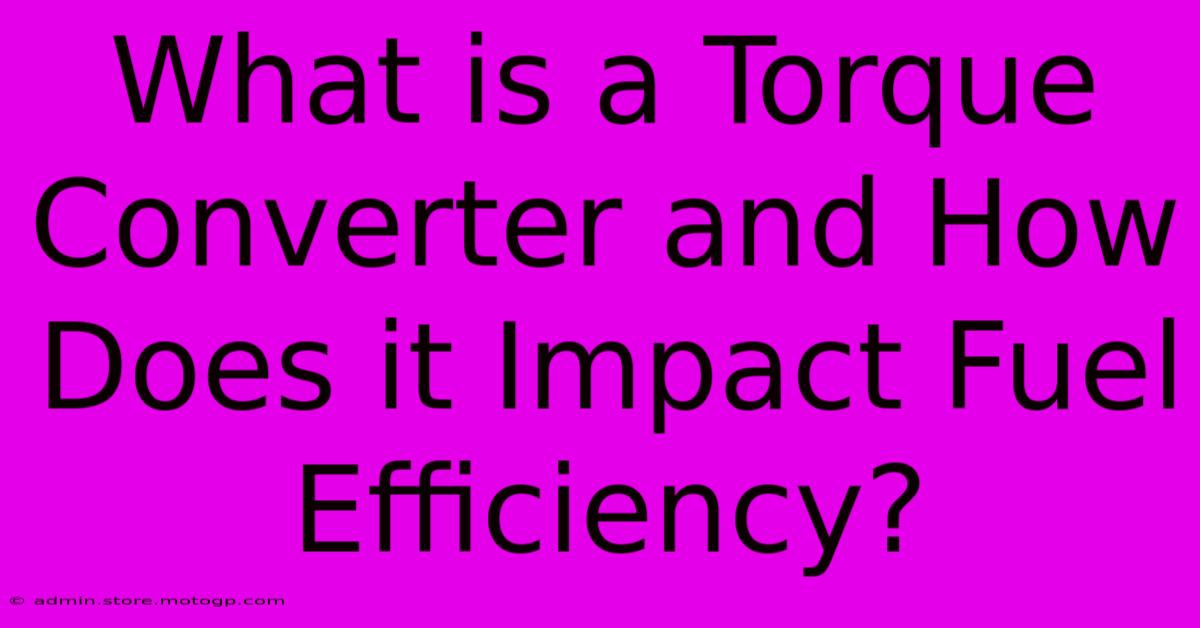What Is A Torque Converter And How Does It Impact Fuel Efficiency?

Table of Contents
What is a Torque Converter and How Does it Impact Fuel Efficiency?
Understanding how your car works can go a long way in helping you maintain it and even improve your fuel economy. One crucial component often overlooked is the torque converter. This article will delve into what a torque converter is, how it functions, and most importantly, its impact on your vehicle's fuel efficiency.
What is a Torque Converter?
A torque converter is a fluid coupling that sits between your engine and the transmission in many automatic vehicles. Unlike a manual transmission's direct clutch engagement, a torque converter uses a hydraulic system to transfer power. Think of it as a sophisticated, fluid-filled clutch. It allows the engine to run smoothly without stalling, even at idle, while gradually transferring power to the wheels.
How Does it Work?
The heart of the torque converter is a turbine and a stator housed within a casing filled with transmission fluid. The engine spins the impeller (pump), which pushes fluid against the turbine. This fluid flow spins the turbine, which is connected to the transmission. As the engine speed increases, more fluid is pumped, and the turbine speeds up, transferring more power. A lock-up clutch further refines this process.
The Role of the Lock-Up Clutch
Modern torque converters often incorporate a lock-up clutch. This clutch mechanically connects the impeller and turbine at higher speeds, eliminating the fluid slippage. This direct connection reduces power loss, resulting in improved fuel efficiency and smoother acceleration. Before the lock-up clutch engages, however, there's inherent energy loss.
The Impact on Fuel Efficiency: The Good and the Bad
The torque converter’s fluid coupling is inherently less efficient than a direct mechanical connection, like that found in manual transmissions. This slippage between the impeller and turbine creates friction and heat, leading to energy loss. This is a primary reason why vehicles with torque converters tend to have slightly lower fuel economy compared to those with manual transmissions.
Factors Affecting Fuel Efficiency:
- Slippage: The amount of slippage in the torque converter directly affects fuel efficiency. More slippage means more energy loss. Advanced designs minimize this slippage through precise fluid dynamics and responsive lock-up clutches.
- Lock-up Clutch Engagement: The speed at which the lock-up clutch engages plays a crucial role. A system that engages the clutch at lower speeds improves fuel efficiency.
- Driving Habits: Aggressive acceleration and frequent braking increase the amount of slippage, negatively impacting fuel economy. Smooth and consistent driving minimizes this.
- Transmission Design: The design and sophistication of the torque converter and overall transmission system are crucial factors influencing fuel efficiency.
How to Improve Fuel Efficiency with a Torque Converter:
While you can't change the fundamental mechanics of your torque converter, you can influence its efficiency through your driving habits:
- Gentle Acceleration: Avoid "jackrabbit" starts. Accelerate smoothly and gradually to reduce slippage.
- Anticipatory Driving: Predict traffic flow and adjust your speed accordingly to minimize braking and acceleration cycles.
- Maintain Proper Tire Inflation: Properly inflated tires reduce rolling resistance, improving fuel efficiency.
- Regular Maintenance: Keep your transmission fluid clean and changed as recommended by the manufacturer. This maintains optimal hydraulic performance.
Conclusion: A Necessary Trade-Off?
Torque converters offer significant advantages, primarily smoother operation and easier driving, especially in stop-and-go traffic. While they do introduce a degree of energy loss, resulting in slightly lower fuel economy compared to manual transmissions, technological advancements like lock-up clutches are continuously improving their efficiency. Ultimately, the trade-off between convenience and fuel economy is a significant factor to consider when choosing a vehicle. Modern designs significantly mitigate the negative impact on fuel economy, making automatic transmissions with torque converters a practical and increasingly efficient option for many drivers.

Thank you for visiting our website wich cover about What Is A Torque Converter And How Does It Impact Fuel Efficiency?. We hope the information provided has been useful to you. Feel free to contact us if you have any questions or need further assistance. See you next time and dont miss to bookmark.
Featured Posts
-
Conquer Medeas Curse A Hundred Knights Epic Journey
Feb 11, 2025
-
Escape The Tourist Traps Explore Crouch End
Feb 11, 2025
-
The Bachelor Season 20 Where Are They Now
Feb 11, 2025
-
Diego Lopez The Missing Piece In Ac Milans Puzzle
Feb 11, 2025
-
The Story Behind The Super Bowl Lix Logo Designer Interview
Feb 11, 2025
